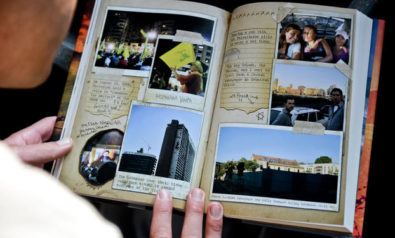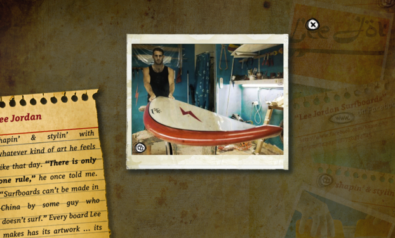The following is the fourth of a six-part series of excerpts that Fair Observer will be featuring from Jesse Aizenstat's Surfing the Middle East: Deviant Journalism from the Lost Generation. Author's Note After getting inadvertently tear-gassed in the West Bank while following my journalist friends to a protest, I make it back to their Bethlehem flat and prepare for my mega, one-day travel from Bethlehem to Beirut. Getting away with this travel stunt with my surfboard will put me in striking distance of completing my mission to surf around the closed border, from Israel to Lebanon. Twenty-Five-Step Program: Bethlehem to Beirut The day after my West Bank gassing I took a Sabbath. I probably was the only goon in Palestinian Bethlehem to observe the Jewish day of rest, but what the hell? I needed the time and the space. The gassing had left me downright exhausted—to the point that I didn’t even realize the pirated DVD I was watching was in Russian . . . until after the goddamn alien invasion of South Africa. The West Bank’s a hell of a place to watch District 9. But no effort could be spent on cinema. This was about recovery. And I needed all the recovery I could get before the next leg of my journey: from Bethlehem to Beirut. This would be the true test of whether surfing from Israel to Lebanon was even achievable. After all. From Haifa to Beirut is 78 miles. From Bethlehem, Beirut is about 150 miles. And to the conventional numbers nerd, I was now farther from my Beiruti destination. But that’s what makes the Middle East so damn interesting—the numbers nerd is wrong. All distance is calculated on the whim of old grudges and strange politics: what papers require how much waiting at what border. This is key. After the First World War, when Western colonial powers helped divide the Middle East into nation-states, people traveled on the ability of The Common Ass. In 1868, Mark Twain claimed that Palestine could be crossed—on The Common Ass—in under a week. But eventually, when cars, airplanes, and paved roads were introduced, The Asses were freed, and all Levantine capitals could be reached within a day. And in 1973, U.S. Secretary of State Henry Kissinger did just that. With the permission of both Israel and the Arab states, Kissinger moved freely, holding swift meetings that ended the fourth Arab-Israeli war. This became known as shuttle diplomacy. And while Kissinger’s ability to quickly hold talks in various capitals proved to be a success, another thing happened that mustn’t be forgotten: people remembered that what used to take The Common Ass a week was now possible in an hour’s flight or afternoon’s cruise. The only problem was you had to be Henry Kissinger to do it. So perhaps that’s why people study the Middle East: with all the closed borders and wars and checkpoints of today, my route—from Israel to Lebanon—might have been faster with Mark Twain and his horde of asses, over 140 years ago. But back to the matter at hand: there is honestly no way to describe the dreadful dizziness and endless zigzags that it took to travel from Bethlehem to Beirut in one grueling day. There weren’t just crazy things happening, but a collection of crazy things, often collaborating with each other in a sort of crazy things synthesis . . . giving a new definition to chaos. It’s like what Stalin said about the Soviet economy: “2 + 2 = 5.” And like the Soviet economy, nothing was ever on the same page. To get from Bethlehem to Beirut I would have to carry four separate identities; four separate stories; four sets of visas, both entry and exit; four sets of currency; three different bus schedules; two passports, with an ability to conceal one of them; a flight schedule; and the f****n’ charm to come off as a sincere connoisseur of Middle Eastern surfing. To do this mind job any sort of justice, I had to dive straight into my sickly, chicken-scratched notes and translate them verbatim. The following is a mixture of notes and words put to pictures amassed on my journey from Bethlehem to Beirut. It is madly twisted but the closest thing to a literal account of what happened—in case there’s anyone out there who wishes to attempt this surfing stunt. Make no mistake: this section is best read high on caffeine with “Love Me Two Times,” by The Doors abusing your eardrums. Read the fifth excerpt from Surfing the Middle East: Deviant Journalism from the Lost Generation on August 15. The views expressed in this article are the author's own and do not necessarily reflect Fair Observer’s editorial policy.
Support Fair Observer
We rely on your support for our independence, diversity and quality.
For more than 10 years, Fair Observer has been free, fair and independent. No billionaire owns us, no advertisers control us. We are a reader-supported nonprofit. Unlike many other publications, we keep our content free for readers regardless of where they live or whether they can afford to pay. We have no paywalls and no ads.
In the post-truth era of fake news, echo chambers and filter bubbles, we publish a plurality of perspectives from around the world. Anyone can publish with us, but everyone goes through a rigorous editorial process. So, you get fact-checked, well-reasoned content instead of noise.
We publish 3,000+ voices from 90+ countries. We also conduct education and training programs
on subjects ranging from digital media and journalism to writing and critical thinking. This
doesn’t come cheap. Servers, editors, trainers and web developers cost
money.
Please consider supporting us on a regular basis as a recurring donor or a
sustaining member.
Will you support FO’s journalism?
We rely on your support for our independence, diversity and quality.












Comment